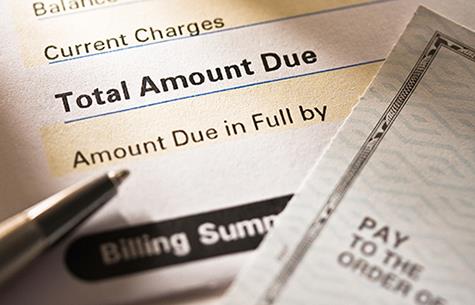March 19, 2020
• 5 Minute Read
The coronavirus pandemic has already had a significant impact on our daily lives, and it’s even started affecting our bank accounts. According to a new poll by NPR, one in five households has reported experiencing a layoff or reduction in work hours, decreasing their incomes.
Whether you’ve already been affected or are simply preparing for the worst, here are seven things you can do now to protect your finances.
1. Review your budget and identify areas to cut back
First, create a budget. Sit down with your bank and credit card statements and look at your recurring expenses, including fixed costs like your rent and utilities and extras like entertainment.
Now is a good time to aggressively eliminate unnecessary expenses, if you have them. For example, stop getting takeout and cook at home, instead. If you have a gym membership or streaming service, consider canceling it to save some extra money.
Use tools like Trim to help you identify unused services. Trim can even help you negotiate your bills, including your cable and internet service.
2. Stop making extra debt payments
Making extra payments toward your debt is smart; you’ll save money on interest charges, and get rid of your debt early. But when your income may be decreasing and your job may not be secure, it may be wiser to save that extra money. Keep making the minimum required payments on your debt, but tuck the additional money into your emergency fund instead to give yourself more of a cash cushion.
3. Lower your student loan payments
If you have student loan payments, they likely eat up a significant chunk of your monthly take-home pay. Keeping up with your payments during this time can be difficult. Luckily, there are a few options available to you.

For federal student loans
If you have federal student loans, there are three payment options to take advantage of right now:
- Waived interest: In March, President Trump announced that interest payments on federal loans would be waived. While you still have to make your minimum payments each month, your entire payment will go toward the principal rather than interest. If you can afford your current monthly payment, taking advantage of this benefit can help you pay off your debt faster.
- Income-driven repayment plans: If you can’t afford your payments, apply for an income-driven repayment (IDR) plan. With an IDR plan, your repayment term is extended and your monthly payment capped at a percentage of your discretionary income. If your income has decreased dramatically, you could qualify for a payment as low as $0 . You can apply for an IDR plan online.
- Forbearance: If you’ve lost your job, you could temporarily postpone making payments for up to 12 months at a time. Depending on what type of loans you have, interest may not even accrue during this time. To request a forbearance, contact your loan servicer.
For private student loans
Some private student loan lenders do offer financial hardship programs. You could temporarily postpone making payments on your debt for several months. While interest will still accrue on your loan, you don’t have to make monthly payments, giving you time to get back on your feet.
4. Talk with your landlord or mortgage lender
First, know that some states — such as New York — are banning evictions right now. But if you can’t afford your rent or mortgage payments, there are ways to get some help.
• Talk to your landlord or lender: Some lenders and landlords are willing to work with tenants and borrowers to extend payment due dates or work out alternative payment plans.
• Contact a U.S. Department of Housing and Urban Development counselor: A counselor can help you figure out a solution, including forbearance or a modified payment plan.
• Request help from Modest Needs: Modest Needs is a non-profit organization that provides low-income workers with small emergency grants to help them stay in their homes.
• Reach out to 2-1-1: 2-1-1 is a national helpline operated by United Way. Your local 2-1-1 can connect you with non-profit organizations and churches that may be able to provide you with financial assistance.
5. Negotiate with your creditors
Reach out to creditors, including credit card companies, utility companies, and personal loan lenders, if you are having trouble affording your payments.
Some creditors are waiving disconnecting services right now due to non-payment, and others may be willing to lower interest rates, waive late fees, or accept lower payments.
6. Explore your health insurance options

If you’ve lost your job or your health insurance due to a reduction in hours, you likely qualify for health insurance through the Special Enrollment Period through the Health Insurance Marketplace. If your income has decreased, you may also qualify for a subsidy that makes insurance coverage much more affordable.
You can search for a policy, find out how much it costs, and apply online at Healthcare.gov .
Low-income families may qualify for Medicaid. Families with children who earn too much money to qualify for Medicaid — but who don’t make enough to afford private coverage — may be eligible for the Children’s Health Insurance Program (CHIP).
7. Take advantage of credit
If you are still employed and have relatively good credit, it’s wise to take advantage of that now. While going into debt isn’t ideal, signing up for a low-interest credit card or a personal loan can give you access to a line of credit that can help you pay for essentials if your income is reduced. By using your credit card or loan only to pay for rent, food, and gas for your car, you can keep your family fed and sheltered, giving you some peace of mind during a very difficult time.
When the economy improves and your income stabilizes, then you can focus on aggressively paying down your debt.
Getting through this crisis
The coronavirus pandemic is unlike anything we’ve had to face before as a nation, and its impact on the economy could be long-lasting. To minimize its effect on your personal finances, take action now to work with your creditors, postpone payments, and take advantage of personal lines of credit to maximize your cash flow.
Editorial Disclaimer: Information in these articles is brought to you by CreditSoup. Banks, issuers, and credit card companies mentioned in the articles do not endorse or guarantee, and are not responsible for, the contents of the articles. The information is accurate to the best of our knowledge when posted; however, all credit card information is presented without warranty. Please check the issuer’s website for the most current information.